Matt Rees's Blog - Posts Tagged "secret"
The Writing Life interview: Gregg Hurwitz
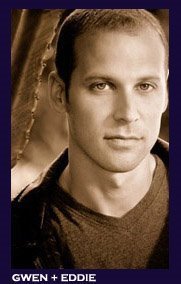
Gregg Hurwitz is the kind of guy other guys would like to be. Hollywood handsome, an accomplished athlete with a tremendous academic record, successful in his chosen field. He’s also the kind of writer other writers would like to be. His thrillers are intricate, thought-provoking, and breathlessly paced. His new book Trust No One, which I reviewed last week, will be out in June, and it’s red hot. Gregg took time out from the busy publicity schedule in advance of his new novel to tell me his views on writing and the life he lives around it.
How long did it take you to get published?
I was very fortunate—more fortunate than I knew at the time. I wrote my first book in college, revised it while getting a one-year masters (in Shakespearean tragedy—hurray for useful degrees!), and sold it shortly after. So I never had to find respectable work.
Would you recommend any books on writing?
I’d recommend reading lots of novels.
What’s a typical writing day?
Up at 7, writing by 8. Work all day. Finish between 4 and 8, depending on deadlines. Sometimes a night shift too if deadlines are threatening.
Plug your latest book. What’s it about? Why’s it so great?
Well, I’ll give you a rundown of the first chapter.
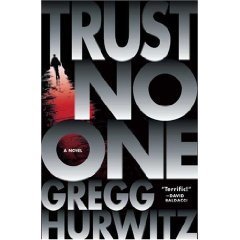
Nick Horrigan, an average guy, awakens in the middle of the night when he thinks he sees a watery blue light along his ceiling. He blinks, and it’s gone. He gets up, rubbing his eyes, crosses into the main room, and looks through the sliding glass door onto the balcony. A black rope is hanging over the lip of the roof and lies coiled on the balcony floor. He opens the slider, steps out, closing the screen behind him.
Down below he sees dark sedans lining the curb on either side, and cop cars with their lights now turned off. Before he can react, the rope twitches, and a guy clad in full SWAT gear rappels off the roof and—not seeing Nick—hammers him in the chest with both boots. Nick soars back into his apartment, ripping the screen from the frame, and lands on his back. His front door flies out of the frame like a hurricane hit on the other side, and slides to within an inch of his nose. And before he can catch his breath, a full SWAT team storms the apartment.
The lead agent grabs him, asks, “Are you Nick Horrigan?” Nick still can’t catch his breath, so he nods. They shove a photo in front of his face. “When’s the last time you’ve had contact with this man?” Nicks says, “I’ve never seen him before.” They tug him to his feet. He’s barefoot, in pajama bottoms. He’s dragged outside. Cop cars everywhere. Neighbors lining the sidewalk. A loud thrumming shakes the air and then the palm trees behind his building light up. A helicopter rolls into view and sets down on the end of his cul-de-sac. He’s dragged toward it, and finally he stops, says, “You can’t just take me. Where the hell am I going?”
And the lead agent replies, “A terrorist has just seized control of the San Onofre nuclear power plant. He’s threatening to blow it up. And the only person he’ll talk to is you.”
And there we end chapter one. I think the thing about this book that made it so much fun to write is its velocity. I really wanted it to move like a freight train, while not sacrificing character. So what took the most work was to keep that pacing tight while also delving into character. I hope readers will find I was successful.
How much of what you do is:
a) formula dictated by the genre within which you write?
b) formula you developed yourself and stuck with?
c) as close to complete originality as it’s possible to get each time?
That’s an interesting question. It’s very hard for me to distinguish because I’ve always been drawn to genre. And to structure. I love Shakespeare, for instance, and he was clearly working within very clearly defined conventions and structures, but also as original as one can get. For me I don’t break it down the way you lay out above. I find a story that I can sink my teeth into, and then I try to let the story guide me to its logical shape. The metaphor I think of is lying down on a towel at the beach. At first it’s uncomfortable and you sort of settle your body down, move the sand from beneath your head, find a comfortable mold for your body. That’s the process of getting to a good story—a lot of squirming and adjustment so it can lie comfortably.
What’s your favorite sentence in all literature, and why?
Molly Bloom’s soliloquy at the end of Ulysses, ending with “Yes I said yes I will yes.” Because if you have to pick one sentence, why not choose one with great stamina? Also, I think the thawing of that relationship is so human and intimate and wonderful, and here, her remembered lovemaking is so tender after everything they’ve been through. Plus, what better way to convey an orgasm?
What’s the best descriptive image in all literature?
Benji in The Sound and the Fury: "It was two now, and then one in the swing." The greatest description of a kiss, from Benji’s limited perspective.
Who’s the greatest stylist currently writing?
Boy, I don’t know. I haven’t read everyone. Louis Begley is pretty staggering. To jump to non-fiction, Christopher Hitchens makes my jaw drop. And James Wolcott is the perfect social commentator. For crime fiction, it still goes to Thomas Harris (for Red Dragon), though Motherless Brooklyn also blew my hair back; after writing that, Lethem must’ve taken a victory lap.
Who’s the greatest plotter currently writing?
I am tempted to answer with a name from politics.
How much research is involved in each of your books?
A good amount. For various books, I’ve gone undercover into mind-control cults, sneaked onto demolition ranges with Navy SEALs to blow up cars, gone up in stunt planes. When I’m dug into a story, my foolishness knows no bounds.
Where’d you get the idea for your main character?
For me, when character collides with plot is when I know I have a book. And so I thought of Nick waking up to this SWAT team storming his apartment in the middle of the night—your classic Everyman in an impossible situation, like Jimmy Stewart in a Hitchcock flick. And then I thought: what if something had happened in his past that, rather than this being a surprise out of the blue, was something he always feared would happen? So that when they drag him in his boxers to the waiting helicopter, while he knows nothing about what’s happening, he DOES know that he’s been marked in a manner since his childhood.
What’s the best idea for marketing a book you can do yourself?
Sandwich boards. Or hide hundred dollar bills in the pages.
What’s your experience with being translated?
I have great relationships with my foreign publishers. I went to Moscow and St. Petersburg recently for book festivals, which was a blast. But what’s funny is: when you’re translated into a language you can’t read, it’s like collaborating with someone when you can’t see the outcome. A writer is very reliant on the talented men and women who translate his work—you go on trust and pray that they have a good ear for the cadence of your writing. And if they don’t, you’ll never know!
Do you live entirely off your writing? How many books did you write before could make a living at it?
Yes. I’ve been quite fortunate. I’ve been writing full-time since I sold my first.
How many books did you write before you were published?
I sold my first, not counting Willie, Julie, and the Case of the Buried Treasure (written in third grade). I’m still shopping that one with little luck.
What’s the strangest thing that happened to you on a book tour?
I was in Minneapolis the day of the bridge collapse, and I was supposed to be going over the bridge at that moment, but my driver took a detour to dodge traffic.
What’s your weirdest idea for a book you’ll never get to publish?
Baseball haiku.
Everything's better in Paris
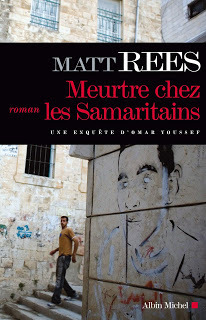
It’s great to hear good news. It’s even better to hear it when you’ve just arrived in Paris. Everything sounds better when you hear it in Paris.
Last week I had a few days in the French capital courtesy of my publisher Albin Michel, which brought me over for the release of my third Palestinian crime novel “Meurtre chez les Samaritains” (English title: “The Samaritan’s Secret”).
On arrival my publicist, a delightful Marseillaise named Agnes Chalnot who works with the elegantly Parisienne Florence Godfernaux, informed me that the first of my Palestinian crime novels “Le Collaborateur de Bethleem” (“The Collaborator of Bethlehem” in the US; "The Bethlehem Murders" in the UK) had been shortlisted for the Prix des Livres de Poche. The winner will be announced in the autumn, but in the meantime it was a lovely way to start my visit.
Albin Michel usually puts me up in the Hotel Lennox, just around the corner from their offices in Montparnasse (that’s the 14th Arondissement, if the numbers make sense to you as they spiral out from the very center of Paris…). It’s a fabulous old artistic area. Norwegian-born photographer Ulf Andersen has lived in the neighborhood a long time and, as we walked about, he showed me the atelier where Picasso used to work, the café where Sartre (“He was very ugly,” Ulf remembers) used to have his morning coffee, and the art deco Hotel Aiglon where Bunuel used to stay when he visited Paris. Nowadays Montparnasse is a bit too pricey for artists, who tend to live in the area near the Bastille.
I enjoy returning each year to Paris when my books come out. Partially that’s because of the culture of books and intellectualism that’s specific to France. The head of Albin Michel who’s a great supporter of my books, Olivier Betourne, used to be the editor of Jacques Derrida, the great deconstructionist philosopher, and my editor Vaiju Naravane is a polymath Indian woman who’s able to tell hilarious tales of trekking to the furthest regions of southern India with Shiva Naipaul.
It’s also because I’ve come to know some of the journalists I meet quite well, particularly those like Philippe Lemaire of Le Parisien and Vladimir de Gmeline of Valeurs Actuelles who have been out to Jerusalem to tour the West Bank with me. This year Philippe remarked that I seemed more relaxed than when my last book came out. I was pleased to hear it, and I must credit my wife Devorah and my son Cai for calming me down!
Another friend I was glad to see during my quick visit was Francois Busnel. He’s one of the most important literary journalists in France and he has an approach to his work that’s vastly different from most of those who write about books. Francois came to Jerusalem to write about me a couple of years ago. He travels each month to interview writers around the world. This summer he’s spending a few weeks in Afghanistan with his friend Kabul-born Atiq Rahimi, who won the Prix Goncourt last year. Not your typical book reviewer, as you can see. If you read French, take a look at his articles in L’Express. They’re excellent.
With only a few hours left in Paris, I picked up a Quiche Lorraine and feuillete de Roquefort near the parliament. The quiche you probably know has chunks of ham. The feuillete is a rich, rich pastry packed with Roquefort, and frankly it was a little too intense for me. But as I sat in the Jardins du Luxembourg with my pastries, watching the French reading books (not playing with Blackberrys) beneath the massive bust of Paul Verlaine, I wished I could take a little of their ethos home with me.
Can't wait for The Corruptionist
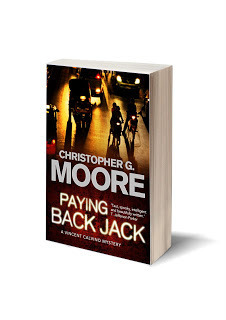
I heard from my chum Christopher G. Moore that he just finished writing the 11th in his series of Vincent Calvino crime novels set in Bangkok. That's good news, because I already read his brilliant and forthcoming Paying Back Jack. (See my review "Elmore Leonard in Bangkok"). Knowing Chris's work, I already love The Corruptionist -- I'm enjoying guessing how he'll use that terrific title and his vibrant cast of characters to take us on another superbly original dive into the underworld of Bangkok.
On his blog, Chris recently wrote about my latest Palestinian crime novel, The Samaritan's Secret. I'm delighted he enjoyed it -- not only because I'm such an admirer of his writing, but also because we share a birthday/a UK publisher/a style of examining the foreign culture in which we live through gritty crime fiction which exposes something you'd never expect about the place. Here's what he wrote:
"Matt Beynon Rees is another author who knows the territory, the people, and the nature of the personal conflicts that separate them. Matt’s turf is Palestine, and his novels are brim with people caught in the vice of poverty, tribal and clan conflict, and facing the constant possibility of violence. He brings Palestine to life. And that is no easy thing.
"One of Matt’s Omar Yussef mysteries does more to take a person into the day-to-day reality of the lives of people in Gaza than a library of newspaper and magazine analysis of Middle East politics. Ultimately understanding countries like the Palestine and North Korea are tied to their history, language, enemies, and traditions. The reality of such a country becomes understandable through emotional lens of the people who live there. Matt channels the sensibility of Graham Greene in this series, building a picture of a time and place that stays with you long after you finish the book."
So while you're waiting for The Corruptionist, get stuck into the first 10 Calvino novels. You won't be disappointed.
Published on June 07, 2009 07:21
•
Tags:
asian, bangkok, calvino, christopher, corruptionist, crime, g, jesus, moore, nablus, omar, palestine, samaritan-s, samaritans, secret, thailand, vincent, yussef
Lecture en francais a Jerusalem
Je fais une lecture en francais chez la librairie francaise a Jerusalem ce mois. Voici les detailles :
«Meurtre chez les Samaritains» de Matt Rees, Editions Albin Michel
Tout est possible en Palestine, et rien ne dit que le jeune Ishaq, le fils du prêtre des Samaritains de Naplouse, n’a pas été exécuté parce qu’il était homosexuel. Rien ne dit non plus que sa connaissance intime des caisses noires du Vieux, l’ancien Président de l’Autorité palestinienne, ne lui a pas été fatale. Après Le Collaborateur de Bethléem (qui vient de sortir en poche) et Une tombe à Gaza, qui ont installé Matt Rees comme l’un des maîtres du polar, cette troisième enquête d’Omar Youssef quadrille le labyrinthe de la casbah de l’antique cité de Cisjordanie et explore les arcanes de l’univers des Samaritains.
"Omar Youssef est le Marlowe de la rue arabe." NewYork Magazine
Matt REES sera à la librairie et signera ses livres le dimanche 28 Juin à 18h30
Librairie Vice-Versa
par téléphone: 02-6244412
par fax: 02-6244112
par mail: lib@viceversalib.com – Notre site: viceversalib.com
«Meurtre chez les Samaritains» de Matt Rees, Editions Albin Michel
Tout est possible en Palestine, et rien ne dit que le jeune Ishaq, le fils du prêtre des Samaritains de Naplouse, n’a pas été exécuté parce qu’il était homosexuel. Rien ne dit non plus que sa connaissance intime des caisses noires du Vieux, l’ancien Président de l’Autorité palestinienne, ne lui a pas été fatale. Après Le Collaborateur de Bethléem (qui vient de sortir en poche) et Une tombe à Gaza, qui ont installé Matt Rees comme l’un des maîtres du polar, cette troisième enquête d’Omar Youssef quadrille le labyrinthe de la casbah de l’antique cité de Cisjordanie et explore les arcanes de l’univers des Samaritains.
"Omar Youssef est le Marlowe de la rue arabe." NewYork Magazine
Matt REES sera à la librairie et signera ses livres le dimanche 28 Juin à 18h30
Librairie Vice-Versa
par téléphone: 02-6244412
par fax: 02-6244112
par mail: lib@viceversalib.com – Notre site: viceversalib.com
Published on June 18, 2009 00:42
•
Tags:
appearances, book, crime, fiction, france, israel, jerusalem, samaritan-s, secret, tour
Is the heat getting to me?
I'm taking a break of a couple of weeks between drafts of my latest novel. To clear my head and to allow my body to accustom itself to a step up in desert heat here in Jerusalem (it's hard to concentrate the first day the temperature hits 35 degrees, particularly when you write standing up as I do). So it's good to have reminders of how my novels are establishing themselves on the international thriller and mystery scene.
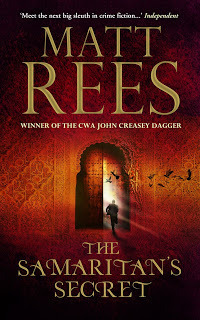
In the post yesterday, I received some copies of the small-format UK version of my third Palestinian crime novel THE SAMARITAN'S SECRET from my editor at Atlantic, the delightful Sarah Norman. The large format edition, published in January, was green. The new one, which'll be published on July 1, is brown. I like it because it's slightly larger (B format in publishing parlance) than the tiny A-format versions of my first two novels, released in the UK as THE BETHLEHEM MURDERS and THE SALADIN MURDERS.
Over at my agent's office, I also picked up copies of my first novel in the French pocketbook version. LE COLLABORATEUR DE BETHLEEM (as THE COLLABORATOR OF BETHLEHEM is known to thin, well-coutured ladies and men who shrug a lot when they say "Boff!") has been nominated for the Prix des Lecteurs des Livres de Poche.
Before I tracked across my agent's courtyard with my pile of French pocket books, I signed a contract for the publication of my first novel in Greek. I'll be with Kastaniotis Editions in Athens. Thus my shelf of foreign-language books will now test my language abilities with one which will be "all Greek to me" and, as my second book came out this month in Holland, "double Dutch."
Maybe the heat's getting to me. With wordplay like that, I ought to get back to the next draft of my novel....

In the post yesterday, I received some copies of the small-format UK version of my third Palestinian crime novel THE SAMARITAN'S SECRET from my editor at Atlantic, the delightful Sarah Norman. The large format edition, published in January, was green. The new one, which'll be published on July 1, is brown. I like it because it's slightly larger (B format in publishing parlance) than the tiny A-format versions of my first two novels, released in the UK as THE BETHLEHEM MURDERS and THE SALADIN MURDERS.
Over at my agent's office, I also picked up copies of my first novel in the French pocketbook version. LE COLLABORATEUR DE BETHLEEM (as THE COLLABORATOR OF BETHLEHEM is known to thin, well-coutured ladies and men who shrug a lot when they say "Boff!") has been nominated for the Prix des Lecteurs des Livres de Poche.
Before I tracked across my agent's courtyard with my pile of French pocket books, I signed a contract for the publication of my first novel in Greek. I'll be with Kastaniotis Editions in Athens. Thus my shelf of foreign-language books will now test my language abilities with one which will be "all Greek to me" and, as my second book came out this month in Holland, "double Dutch."
Maybe the heat's getting to me. With wordplay like that, I ought to get back to the next draft of my novel....
Published on June 26, 2009 00:13
•
Tags:
athens, awards, bethlehem, collaborator, france, greece, holland, israel, jerusalem, kastaniotis, murders, omar, palestinians, samaritan-s, secret, yussef
Hot Reading in East Jerusalem!
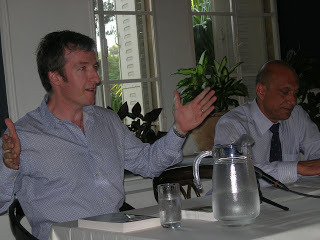
This weekend I was the guest of Munther Fahmi, who runs the excellent bookshop at the American Colony Hotel in East Jerusalem, for a reading from my newest Palestinian crime novel THE SAMARITAN'S SECRET. Munther and I have been scheming for some time to organize an event, so it was great to finally get it together.
I knew it'd be an interesting crowd at the Colony, which manages to be something like neutral ground (although many Israelis might dispute that) in Jerusalem. There were foreign journalists and diplomats, Israelis and Palestinians among the sizeable crowd, including some old friends I haven't seen for some time. Oh, and tourists, too -- a rare species since the intifada, but I signed for visitors from Berlin and Seattle, Ireland and Serbia.
I was also delighted that one of the people on whom I based the character of a World Bank worker in THE SAMARITAN'S SECRET happened to be staying at the Colony this weekend. I was able to give him the news that I'd turned him into a woman and changed his employer. He seemed pleased with both alterations, and I hope he enjoys the book.
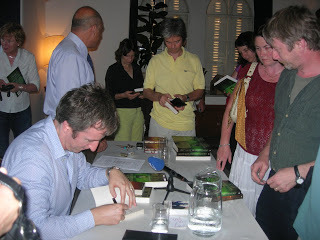
I've edited the photos so that you can't see how hot it became in the room. By the time I was signing the books at the end I was rather inelegantly dripping with sweat. The alternative, of course, was the honking of passing Arab wedding convoys and, as antiglobalization activist Naomi Klein discovered when the windows were opened to let in some air for her reading immediately after mine, the evening call to prayers by the muezzin at the mosque next door. (It's the Mosque of Sheikh Jarrah, named after Saladin's doctor, whose tomb it houses.)
To get on Munther's mailing list for future readings at his excellent bookshop, write to him at bookshopat@gmail.com.
Published on June 28, 2009 03:05
•
Tags:
appearances, book, doctine, globalization, ireland, islam, israel, jerusalem, klein, naomi, nonfiction, omar, palestine, palestinians, samaritan-s, samaritans, secret, shock, tour, yussef
Donate my books to Gaza
The Washington Report on Middle East Affairs is organizing donations of books to libraries and schools in the Gaza Strip. I'm delighted to learn that my Palestinian crime novels are included on the list, which I should add includes works by many of my favorite Arab and Muslim writers (I'm a big fan of Tariq Ali's series of novels about Muslim history, in particular The Shadow of the Pomegranate Tree, which recalls the last days of al-Andalus in medieval Spain.)
You may wonder if people sitting in the ruins of Gaza would want to read crime stories about Palestinians. Actually I've received many emails from Palestinians and other Arabs thanking me for showing the reality of the situation in which they live. I hope the people of Gaza will read my books and feel happy to know that their plight is portrayed in as accurate a manner as possible for readers all around the world -- rather than in the stereotyped terms often used in newspaper reports.
I hope you'll consider participating in the donation scheme. Gaza was truly flattened in the war that took place there at the turn of the year. Whether you consider yourself "pro-Palestinian" or "pro-Israeli," it's clear that a better life for the people of Gaza will contribute to a better, more peaceful life for their neighbors. And despite all the other necessities lacking in Gaza, books are one thing no one should have to live without.
You may wonder if people sitting in the ruins of Gaza would want to read crime stories about Palestinians. Actually I've received many emails from Palestinians and other Arabs thanking me for showing the reality of the situation in which they live. I hope the people of Gaza will read my books and feel happy to know that their plight is portrayed in as accurate a manner as possible for readers all around the world -- rather than in the stereotyped terms often used in newspaper reports.
I hope you'll consider participating in the donation scheme. Gaza was truly flattened in the war that took place there at the turn of the year. Whether you consider yourself "pro-Palestinian" or "pro-Israeli," it's clear that a better life for the people of Gaza will contribute to a better, more peaceful life for their neighbors. And despite all the other necessities lacking in Gaza, books are one thing no one should have to live without.
Published on July 04, 2009 02:09
•
Tags:
bethlehem, collaborator, gaza, grave, murders, omar, palestine, palestinians, saladin, samaritan-s, secret, spain, yussef
International Noir: Contrast to hardboiled environs gives Omar edge
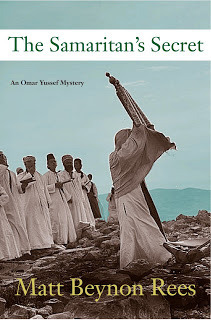
The blog International Noir Fiction describes my series of Omar Yussef Mysteries as creating a "comedie humaine" for the Palestinians. It's a great review of the third of my novels THE SAMARITAN'S SECRET by a reviewer who's obviously read and enjoyed the first two books as well. The review notes many of the aspects of Omar's impulsive, sensitive character which defy the detective genre. I particularly like this: "Rees give us a couple of chase sequences that are nonetheless exciting for Omar Yussef's lack of speed and agility--and are not simply amusing or "cute" as has been the case with some elderly detectives over the years of the genre. INF concludes: "Rees provides insight and also a satisfying crime story."
Published on July 10, 2009 23:07
•
Tags:
blogs, crime, fiction, hardboiled, omar, palestine, palestinians, reviews, samaritan-s, samaritans, secret, yussef
Washington Report: Omar Yussef novels 'rich in intellectual complexity'
The Washington Report on Middle East Affairs has a forthcoming review praising my series of Palestinian crime novels "rich not only in character but in intellectual complexity." I blush to report that WRMEA Managing editor Janet McMahon and Don Neff, a famed predecessor of mine as Jerusalem bureau chief for Time Magazine, say I'm "a wonderfully subtle writer with a deep understanding of Palestinians and their culture." Well, actually I haven't blushed since I was about 12 years old and I'll never tell what that was about...
Published on July 12, 2009 01:01
•
Tags:
bethlehem, collaborator, crime, east, fiction, gaza, grave, middle, omar, palestinians, reviews, samaritan-s, secret, yussef
Dessert wars in the West Bank
It isn't only McDonald's that offers to supersize its food. In the most violent town in the West Bank, the local specialty is a hot cheese and syrup dessert called qanafi. Last month a Nablus baker made a qanafi that weighed 1,300 kg (1.3 tonnes). After the townspeople recovered from the sugar rush, a real estate developer put together a team this weekend to make a 1,700 kg qanafi that was 74 yards long.
The intention is to repair the image of a city damaged by nine years as the most dangerous place in one of the most dangerous regions of the world--by making enormous amounts of the thing Nablus would rather be famous for. The Palestinian Authority and Israel recently agreed to loosen military restrictions on the city a little. Of course, if you ate a few meters of the record-breaking qanafi (Guiness affirmation is awaited) it'd probably kill you -- but slower than a gunbattle. And what a way to go....
My favorite spot for qanafi is on the edge of the old casbah. It's called Aksa Sweets and it's always full of local men eating six-inch-square slices of the hot dessert. Qanafi's made with a base of elastic goats' cheese topped by a layer of noodles that look like shredded wheat, all drowned in a syrup so vibrantly orange that even Andy Warhol would have thought it in poor taste. The qanafi sits on wide circular metal trays, heated by a gas burner the size of an oil drum. Those who don't sit down take a big slice and eat it like Americans eat pizza, lifting it and seeming to pour it down their throats as they walk.
Part of the plot of my third Palestinian crime novel THE SAMARITAN'S SECRET revolved around my hero's attempts to defy the violence of the casbah to take his granddaughter for a slice of qanafi at a place based on Aksa Sweets. People eat qanafi all over the Arab world, but Nablus is where it was first made and the particular mix of goats' cheeses used here guarantees that it's the best place to eat it.
Here's how it's made:
The intention is to repair the image of a city damaged by nine years as the most dangerous place in one of the most dangerous regions of the world--by making enormous amounts of the thing Nablus would rather be famous for. The Palestinian Authority and Israel recently agreed to loosen military restrictions on the city a little. Of course, if you ate a few meters of the record-breaking qanafi (Guiness affirmation is awaited) it'd probably kill you -- but slower than a gunbattle. And what a way to go....
My favorite spot for qanafi is on the edge of the old casbah. It's called Aksa Sweets and it's always full of local men eating six-inch-square slices of the hot dessert. Qanafi's made with a base of elastic goats' cheese topped by a layer of noodles that look like shredded wheat, all drowned in a syrup so vibrantly orange that even Andy Warhol would have thought it in poor taste. The qanafi sits on wide circular metal trays, heated by a gas burner the size of an oil drum. Those who don't sit down take a big slice and eat it like Americans eat pizza, lifting it and seeming to pour it down their throats as they walk.
Part of the plot of my third Palestinian crime novel THE SAMARITAN'S SECRET revolved around my hero's attempts to defy the violence of the casbah to take his granddaughter for a slice of qanafi at a place based on Aksa Sweets. People eat qanafi all over the Arab world, but Nablus is where it was first made and the particular mix of goats' cheeses used here guarantees that it's the best place to eat it.
Here's how it's made:
Published on July 19, 2009 07:44
•
Tags:
east, middle, nablus, palestine, palestinians, samaritan-s, secret



